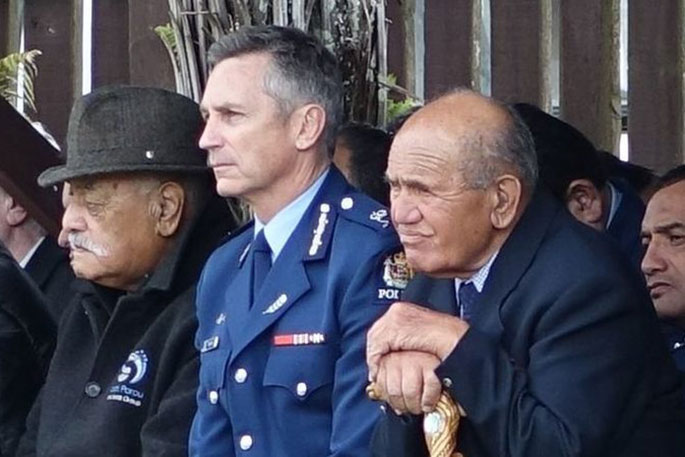Ten years ago, with new anti-terrorism powers under their belt, police swooped on the people of Tūhoe in what has come to be known as the Urewera raids.
They set up two unlawful road blocks in Ruatoki and Taneatua, detained innocent people and searched private property while hunting for people they believed were involved in military-style training camps in Te Urewera Ranges.
Police believed more than 60 people had attended six training camps in 2006 and 2007 and that they had used a range of weapons, including Molotov cocktails, and had been practising ambush and interrogation techniques.
The raids took place in the early hours of Monday morning on 15 October 2007. The Armed Offenders Squad raided homes around the country looking for terrorists - people they claimed wanted to hurt New Zealand politicians and bomb parliament.
But none of the 17 people arrested ended up facing charges under the Terrorism Suppression Act after the Solicitor-General said the evidence was insufficient.
In the end, four people were found guilty in 2012 of illegally possessing firearms. Tame Iti and Rangikaiwhiria Kemara were sentenced to 30 months imprisonment and Urs Signer and Emily Bailey were given home detention.
The effects of the raids still linger for many families, including for Ati Teepa, who was away from his home when it was raided.
"I think there is still lots of unresolved issues around the raids, particularly some of the young children that were caught up in the raids. My brother's young family saw the guys in the masks and the guns, they saw their grandfather and father dragged out of the home early hours of the morning in the dark."
It would have been terrifying, says Ati.
"I think there are still issues for those young tamariki - and it wasn't just my brother's tamariki, there were children in other homes."
Police have worked hard to restore their relationship with Tūhoe iwi members, especially the tamariki.
In 2014, Police Commissioner Mike Bush travelled to the Tūhoe community, and while not prepared to apologise for the investigation itself, he did express regret for the way police acted.
"Especially in respect to searches and detaining people that were unlawful, so we have apologised for that. Also just in the way we actually treated people with disrespect, particularly the innocent people, the young people - the tamariki and mokopuna."
Ati says he appreciates the police had tried hard to make amends, but his whānau didn't want an apology.
"We didn't want them in the home and we didn't want to meet with them, we didn't want to be part of what I cynically see as a public relations exercise where they were coming to seek forgiveness from Tūhoe.
"I don't know why they had to make such a big song and dance out of something that could've been a private affair."
Tūhoe leader Tamati Kruger says the terrorist allegations were completely unbelievable and a shock for Tūhoe iwi members, with some believing it was a plot to stop the 2013 Tūhoe settlement with the Crown.
"Some Tūhoe people saw this as a body of proof of the anti-Tūhoe stance of the government and the Crown that stretches back to 1850 and there were other Tūhoe people that were severely hurt by the experience," says Tamati.
Tūhoe took it upon themselves to reconcile with police, which Tamati says was an example of mana motuhake (self determination).
"When you can deal with your own issues you have mana motuhake, when you use your own traditions and customs to do that.
"Ten years later that reconciliation is sustainable and reliable, between ourselves and the police."
"Honestly I don't really want to go back to that and I don't want to justify and have to explain myself.
"Moving on, you let go. It happened."
Since the raids, no one has ever been successfully charged and convicted under the Terrorism Supression Act.



5 comments
Tama
Posted on 13-10-2017 09:07 | By overit
well said "moving on, you let go. It happened". Wish that could be said about a few other pieces of NZ's history.
MMMnnnn
Posted on 13-10-2017 13:30 | By rastus
The truth of this story was that the police amassed a lot of video identifying their claims of this ill fated training camp. Due to the manipulation of the then laws these videos which were the backbone of the prosecutions were disallowed and therefore the case(s) were in the main dropped. All we have seen and heard subsequently has been lots of bowing and scraping and sighs of relief from the perpetrators.
PC nonsense rules in NZ
Posted on 13-10-2017 14:10 | By Captain Sensible
We all know the Police were correct but because of BS touchy feely laws, their evidence was not allowed. I guess in 200 years there will still be full and final apologies going on. Tuhoe have failed to provide a plausible explanation for what was filmed.
Home grown terrorism
Posted on 13-10-2017 18:39 | By NZer
Expect to see more of it. These people were not innocent!!
It's all about weapons possession
Posted on 15-10-2017 10:57 | By Papamoaner
I don't understand all these apologies and humble posturing. It's got nothing to do with race or ethnicity - it's all about guns. The police acted correctly and professionally and should not apologise for anything. The threat was very real. There are published psychology papers on this very subject that can be found by googling WEAPONS EFFECT. It's a short easy read, and very illuminating. The Wikipedia article on that subject is probably the easiest one to go to.
Leave a Comment
You must be logged in to make a comment.